If your dog ate plastic, what should you do to save your canine companion?
Your immediate course of action depends on what kind of plastic object your dog ate and when he ate it.
However, when it comes to man’s best friend, pet parents must never take chances with their pet’s health and well-being. So, if you think your dog ate plastic, we recommend you contact your vet clinic immediately and ask them for advice.
Keep reading to learn what to do if your dog eats plastic.
Plastic Objects That Pose A Risk To Our Dogs
Since dogs don’t have hands, they explore new objects with their mouths, especially as puppies when teething.
As humans, we’re used to seeing dozens of plastic items around our homes and gardens. Those objects are usually so familiar we barely notice them. However, dogs can find a seemingly harmless plastic object too tempting to resist checking out!
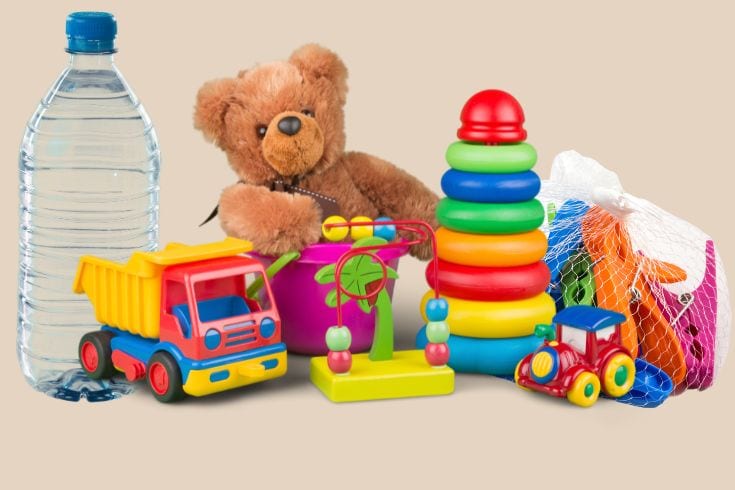
Everyday plastics that frequently cause problems for pets dogs can include the following:
- Plastic clothes pegs
- Kids’ toys
- Plastic bottles
- Plastic cord or string
- Laundry cubes (the liquid inside will make your dog sick, although the plastic cover might just pass through your pet.)
- Hard, plastic dog beds
- Packaging and plastic wrappers
- Pens
Pretty much anything made of plastic could present a risk to your dog. So, be sure to put tempting objects out of sight in a secure location your dog can’t reach.
My Dog Ate Plastic – Possible Outcomes
There are several possible outcomes when a dog ingests a foreign object:
- The object might be small and smooth, so it could simply pass through your dog with no ill effects. Once the object appears in your dog’s poop, you can breathe a sigh of relief!
- If the object is an awkward shape or has a rough surface, it could still pass through your dog but might cause some mild diarrhea or vomiting as it does so.
- Sharp edges and pointed pieces of plastic can pierce the gut wall, potentially leading to a dangerous infection and medical emergency.
- Plastic string or cord can wrap itself around your dog’s intestines, causing an intestinal blockage.
If the type of plastic eaten is very sharp and pointed, it could penetrate the gut wall, causing fecal material to leak into the dog’s stomach. That can result in a potentially fatal condition called peritonitis.
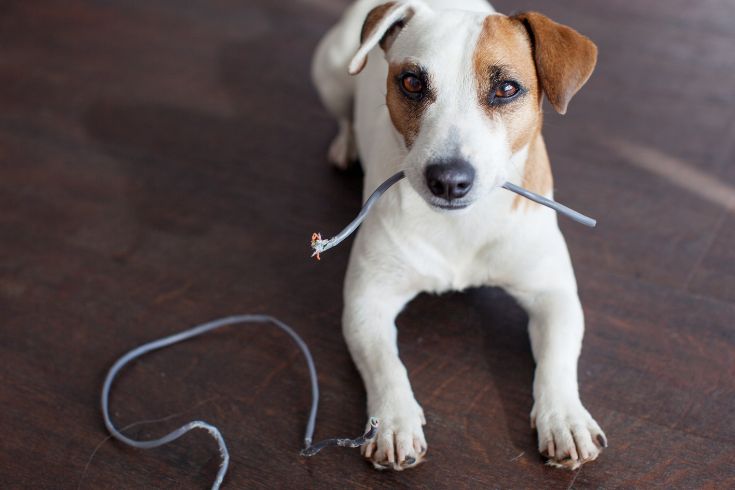
Long, thin plastic, such as rope, string, tape, and the like, can get stuck in the dog’s gut, preventing peristalsis from taking place. Peristalsis is the squeezing process used by the muscles of the dog’s gut to force food through the digestive tract.
A piece of thin material can cut right through the gut wall, again causing fecal material to leak and causing peritonitis.
Symptoms
If the plastic object your dog has eaten can’t pass through his guts, he will display various signs that can tell your vet where the object is stuck.
Blockages in the dog’s stomach or small intestine typically cause severe vomiting, and the dog might not pass any feces. A blockage lower down the bowel in the dog’s colon will result in the dog struggling to poop but not passing anything. If the object has been stuck there for a while, the dog might start vomiting.
Your dog might be off his food, very subdued, and lethargic, and he’ll probably show signs of discomfort if you touch his belly. If your dog is still pooping, you might notice blood in the feces.
Treatment Options
No veterinary treatment is necessary when the plastic object is small and passes through your dog without causing problems.
However, if you suspect your dog has eaten something plastic and he develops mild diarrhea and vomiting, you must consult your vet for advice.
On a few occasions, my dog had those symptoms, and I wasn’t sure what she had eaten that could be causing the problem. My vet prescribed anti-inflammatory drugs to soothe the inflamed intestine and prevent sickness and recommended a bland chicken and rice diet while my dog recovered.
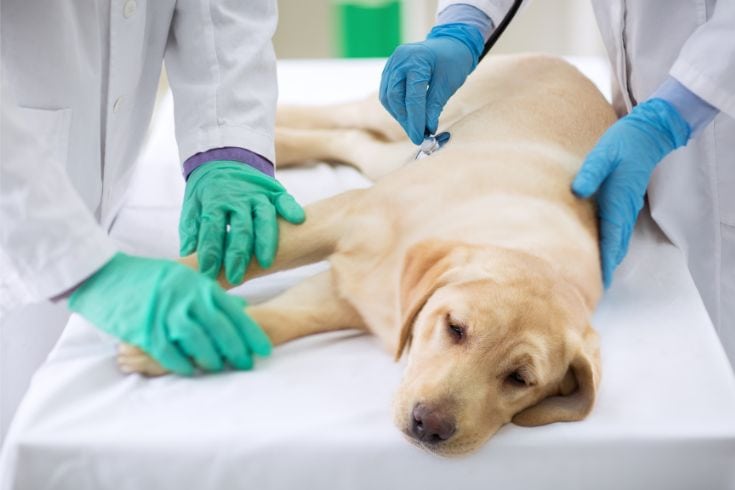
If the foreign object is stuck or a sharp object has penetrated the gut wall, your dog will need an operation to remove the blockage and clear the gut of infection. That’s a serious procedure that will probably necessitate a few days of hospitalization for your beloved furry friend.
My Dog Ate Plastic – What Should I Do?
You should do several things if you think your dog ate plastic.
Call Your Vet!
It’s always better to be safe than sorry, so we strongly recommend you contact your veterinarian for advice if you suspect your dog has ingested plastic.
How Much Plastic Did Your Dog Eat?
If possible, try to work out how much plastic your dog ate. Examine whatever your pet was chewing on to see if you can tell how much he ate. That information can be helpful to your vet, especially if surgery is required to remove the object.
Is Your Dog Choking?
If your dog has tried to swallow a large piece of plastic, he might choke.
In that case, treat the situation as an emergency, and get your dog to the vet as quickly as possible. Don’t attempt to remove the object by sticking your fingers down your dog’s throat! That could worsen the situation by pushing the object further down and will distress your pet.
Look At Your Dog’s Posture
If your dog is standing normally and lying down without showing discomfort, there’s probably nothing serious wrong.
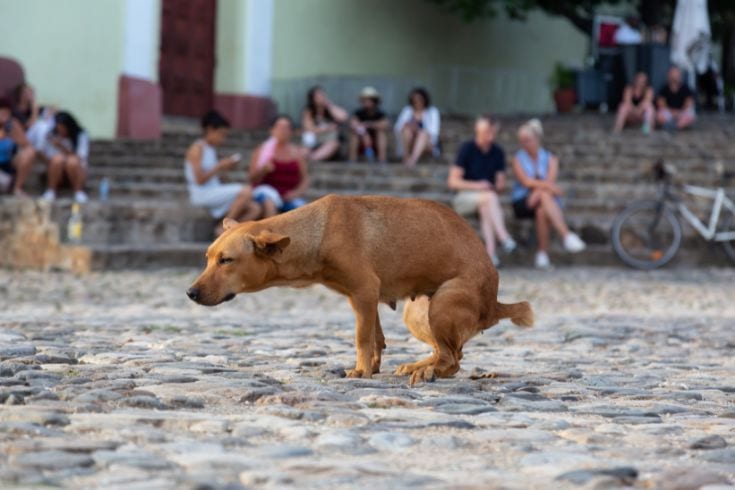
However, if your pet is straining to poop without producing anything, hunching over, or crouching with his tail between his legs, that body language tells you something is seriously wrong with your pet.
Your dog could have stomach pains or a bowel obstruction and should be checked by your vet immediately.
Breathing Difficulties
Sometimes, if a dog ingests a large piece of plastic, he will develop breathing difficulties, such as panting with his mouth open, lying on one side, and showing excessive movement of his sides as he breathes.
Remove Plastic
Bits of plastic can get stuck in your dog’s teeth or mouth, especially if your pet still appears to be chewing something.
In that case, open your dog’s mouth gently and try to remove any plastic you find in there. If you can’t manage to do that because your dog is upset and tries to bite you, take your pup to the vet.
Prevention
Of course, prevention is definitely much better than cure when it comes to dogs eating plastic! So, be careful not to leave anything hazardous lying around that your dog could get his teeth into.
Puppies are especially notorious for eating and chewing things they shouldn’t, especially when teething. Check your pup’s plastic toys, bed, and crate daily for signs of damage, remove anything potentially dangerous, and replace it as soon as possible.
FAQs
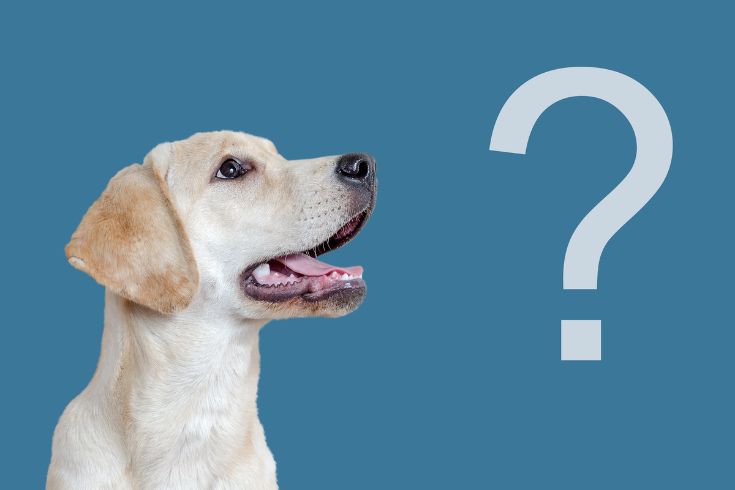
In this part of our guide, we answer some of the most frequently asked questions about what to do if your dog starts choking.
Q: When should you take your dog to see a vet?
A: If you think your dog has eaten plastic, it’s always wise to call your vet clinic for advice. However, if your dog shows signs of distress, choking, breathing difficulties, excessive vomiting, or diarrhea, it’s time to go to the vet.
In addition, if you suspect your dog has gobbled up a large quantity of plastic, a prompt visit to the vet is definitely in order.
Q: What happens when a dog eats a plastic bag?
A: That depends on the size of the plastic bag! Very small bags often pass right through a dog without causing problems. However, large bags can cause choking or bowel obstruction, and a visit to the vet is always necessary.
Q: Should you make your dog vomit?
A: No. It’s not advisable to make your dog vomit to try to make him throw up whatever plastic he’s swallowed.
If your dog vomits, he might choke on the plastic, or the object could cause an obstruction, making the situation worse. Instead, contact your vet clinic for advice.
Q: Will you see the plastic in your dog’s poop?
A: Sometimes, if your dog has eaten a small, smooth plastic object, it will pass right through your pup without causing problems, and plastic fragments could be visible in your dog’s poop.
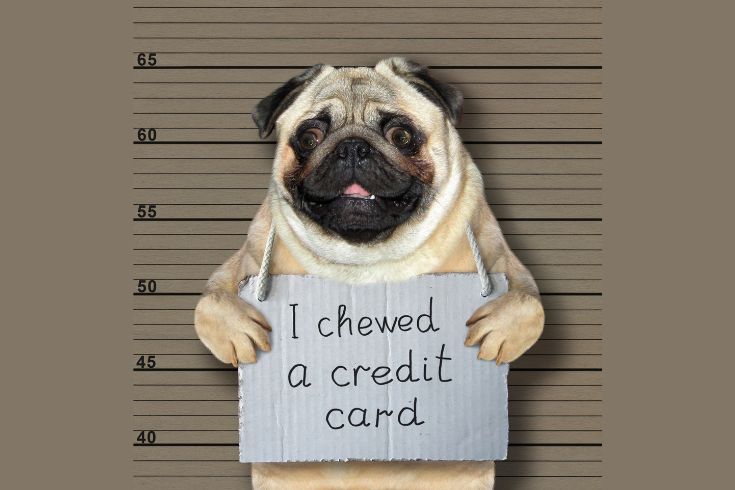
Your dog should be fine if you’re sure all the ingested plastic object has come out. However, if you don’t know how much plastic your pet ingested, it’s advisable to have your dog checked over by your vet.
Q: How long does it take for a dog to pass an object?
A: When your dog eats something, it usually takes between ten and 24 hours for the object to move through the entire digestive tract. If the object hasn’t appeared after ten hours, we recommend that you ask your vet for advice.
Final Thoughts
I hope you enjoyed our guide on what to do if your dog ate plastic. If you found the information helpful, please share the article.
Unfortunately, dogs, especially puppies, love to chew stuff they’re not supposed to. Plastic objects can present a risk of choking, intestinal obstruction, and peritonitis, so you must take care to put any plastic objects out of your pet’s reach.
If you think your dog has eaten plastic, call your vet for advice right away. Hopefully, your dog will pass the object naturally. However, veterinary attention will be required to save your canine companion in more serious cases.
Did your dog eat plastic? What did you do? Tell us what happened in the comments box below!
